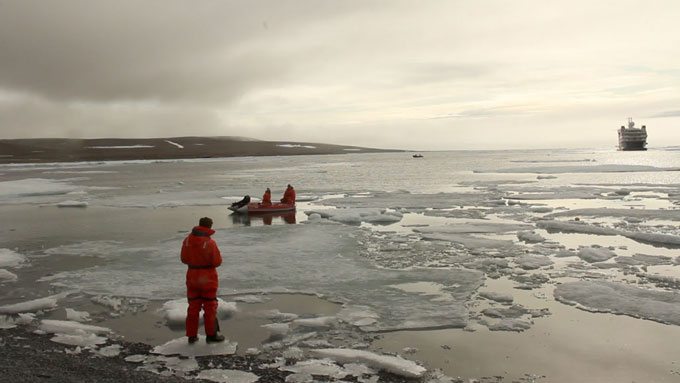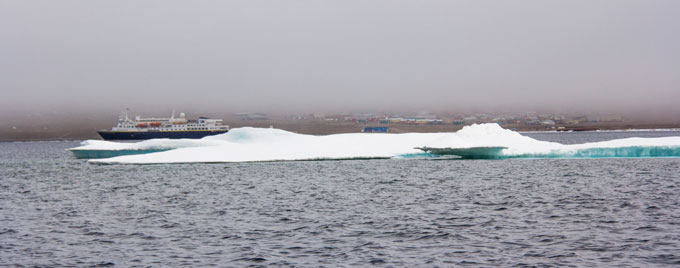The noise of shipping vessels traveling through northern Canadian waters is causing Arctic cod to sacrifice much of their foraging and feeding in order to flee the area until ships move away, researchers report.
The findings — the first to gauge how shipping noise could affect Arctic fish — are cause for concern as climate change increases ice melt (SN: 12/11/19), drawing more shipping traffic to the region, researchers say in the study, which will be included in the April issue of Ecological Applications. Scientists previously have reported negative effects from ship noise on marine mammals, such as porpoises (SN: 2/13/18) and beaked whales (SN: 3/25/11).
“The results were staggering,” says Aaron Fisk, a biologist at the University of Windsor in Canada. Fish are known to use sound for foraging, avoiding predators, navigating and communicating (SN: 9/30/14), and noise pollution could threaten those behaviors, he says. “Hearing is more important to fish than we realize.”
Fisk and his colleagues used cameras to record ship locations in August and September of 2012, while acoustic tags tracked 77 schooling Arctic cod in Resolute Bay, off Cornwallis Island in the Canadian territory of Nunavut. The team then compared the fish location data with footage of the passing ships to determine whether the fish were moving in response to the vessels.
 Researchers had to work out the logistics of sampling Arctic cod amid ice floes in Resolute Bay in Nunavut, Canada. Declining sea ice is opening the region up to increased shipping traffic.Silviya Ivanova
Researchers had to work out the logistics of sampling Arctic cod amid ice floes in Resolute Bay in Nunavut, Canada. Declining sea ice is opening the region up to increased shipping traffic.Silviya Ivanova
When no ships were present, the cod stayed in one area of a 30-meter-deep depression in the bay. But when a ship passed — creating sounds as loud as 147 decibels underwater, similar to the noise from a motorcycle engine and much higher than the bay’s ambient noise level of 74 decibels — the fish abandoned their normal feeding behavior. They fled the disturbance, swimming up to 350 meters away for periods of up to 30 minutes. That means the fish were spending more energy swimming, and less time gaining calories, Fisk says.
Because most shipping occurs during the summer, the crucial open-water feeding period for marine species, such acoustic disturbance could impact the region’s food web, Fisk notes. Arctic cod (Boreogadus saida) are a key prey species for other fish as well as whales and seals. Schools of Arctic cod appear almost like “big oil slicks” in the ocean, moving in patterns that predators may have come to rely on, Fisk says (SN: 11/8/11). “It’s likely marine mammals are keyed into those times. If shipping activity disrupts the schools, that will cascade down to seals, whales, polar bears and the Inuit who use those mammals as a food source.”
 As climate change reduces Arctic sea ice, more ships are passing the community of Resolute Bay (shown), in the northern Canadian territory of Nunavut. One ship analyzed by researchers created underwater sounds as loud as 147 decibels, nearly double the bay’s ambient noise.Silviya Ivanova
As climate change reduces Arctic sea ice, more ships are passing the community of Resolute Bay (shown), in the northern Canadian territory of Nunavut. One ship analyzed by researchers created underwater sounds as loud as 147 decibels, nearly double the bay’s ambient noise.Silviya Ivanova
Shipping traffic in the area is expected to grow as Arctic sea ice melts at an increasing rate (SN: 9/25/19), opening a direct route between North America and Asia through the Northwest Passage. Already, the number of passing vessels has gone from about four ships per year in the 1980s to 27 ships in 2019.
Besides noise, Arctic cod face a range of other threats, including exposure to oil from drilling, the loss of sea ice that is crucial for protecting their developing eggs from damage by waves and currents, and warming ocean waters.
While Arctic cod do best at around 3° Celsius, “the surface of the Arctic Ocean, when the ice clear, is now getting up to 10° Celsius” says Helen Drost, a zoologist at the University of British Columbia in Vancouver who has studied the impact of warming on the species. That means Arctic cod are no longer able to use the surface waters for feeding and foraging when it’s really warm in summers.
“Add noise to that, and you’ve got one more thing” stressing the species, Drost says. “It’s significant if [the cod] are being frightened by ships into areas that aren’t their optimum habitat, or away from their prey, because they already have such a short season to fatten up.”
Though more work is needed to understand the full impact of noise on the fish and their behavior, “these kinds of studies that assess the movements of animals are more important than ever,” Fisk says. “We don’t have a good handle on what’s going on in the Arctic.”
Source: Heart - www.sciencenews.org



